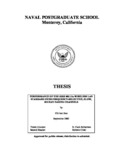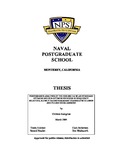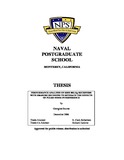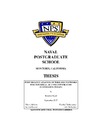Performance of IEEE 802.11a wireless LAN standard over frequency-selective, slow, ricean fading channels
| dc.contributor.advisor | Robertson, R. Clark | |
| dc.contributor.advisor | Cristi, Roberto | |
| dc.contributor.author | Kao, Chi-Han | |
| dc.date | September 2002 | |
| dc.date.accessioned | 2012-03-14T17:43:56Z | |
| dc.date.available | 2012-03-14T17:43:56Z | |
| dc.date.issued | 2002-09 | |
| dc.identifier.uri | https://hdl.handle.net/10945/5020 | |
| dc.description.abstract | With the rapidly growing demand for more reliable and higher data rate wireless communications, the Institute of the Electrical and Electronics Engineers (IEEE) 802.11 working group approved a standard for 5 GHz band, wireless local area networks (WLAN) in 1999. This standard, IEEE 802.11a, supports data rates from 6 up to 54 Mbps, and uses orthogonal frequency division multiplexing (OFDM) for transmission in indoor wireless environments. This thesis examines the performance of the IEEE 802.11a standard for different combinations of sub-carrier modulation type and code rate and determines the signal-to-noise ratio required to obtain a probability of bit error b P of 10-5. The channel is modeled as a frequency-selective, slow, Ricean fading channel with additive white Gaussian noise (AWGN). Contrary to expectations, for the combinations of sub-carrier modulation type and code rate utilized by the IEEE 802.11a standard, some of the higher data rate combinations outperform some of the lower data rate combinations. On the other hand, the results also show significant coding gain when applying convolutional coding with Viterbi decoding, and hence highlight the importance of forward error correction (FEC) coding to the performance of wireless communications systems. | en_US |
| dc.description.uri | http://archive.org/details/performanceofiee109455020 | |
| dc.format.extent | xviii, 95 p. : ill. (some col.) | en_US |
| dc.publisher | Monterey California. Naval Postgraduate School | en_US |
| dc.rights | Copyright is reserved by the copyright owner | en_US |
| dc.subject.lcsh | Wireless communication systems | en_US |
| dc.subject.lcsh | Wireless LANs | en_US |
| dc.title | Performance of IEEE 802.11a wireless LAN standard over frequency-selective, slow, ricean fading channels | en_US |
| dc.type | Thesis | en_US |
| dc.contributor.department | Electrical and Computer Engineering | |
| dc.subject.author | IEEE 802.11a standard | en_US |
| dc.subject.author | WLAN | en_US |
| dc.subject.author | OFDM | en_US |
| dc.subject.author | BPSK | en_US |
| dc.subject.author | QPSK | en_US |
| dc.subject.author | QAM | en_US |
| dc.subject.author | Probability of bit error | en_US |
| dc.subject.author | frequency-selective fading | en_US |
| dc.subject.author | flat fading | en_US |
| dc.subject.author | Fast fading | en_US |
| dc.subject.author | Slow fading | en_US |
| dc.subject.author | Ricean fading | en_US |
| dc.subject.author | Rayleigh fading | en_US |
| dc.subject.author | Viterbi algorithm | en_US |
| dc.subject.author | Convolutional code | en_US |
| dc.subject.author | Hard-decision decoding | en_US |
| dc.subject.author | Soft-decision decoding | en_US |
| dc.subject.author | Coding gain | en_US |
| dc.description.service | Lieutenant Commander, Republic of China (Taiwan) Navy | en_US |
| etd.thesisdegree.name | M.S. in Electrical Engineering | en_US |
| etd.thesisdegree.level | Masters | en_US |
| etd.thesisdegree.discipline | Electrical Engineering | en_US |
| etd.thesisdegree.grantor | Naval Postgraduate School | en_US |
| etd.verified | no | en_US |
| dc.description.distributionstatement | Approved for public release; distribution is unlimited. |
Files in this item
This item appears in the following Collection(s)
-
1. Thesis and Dissertation Collection, all items
Publicly releasable NPS Theses, Dissertations, MBA Professional Reports, Joint Applied Projects, Systems Engineering Project Reports and other NPS degree-earning written works.





